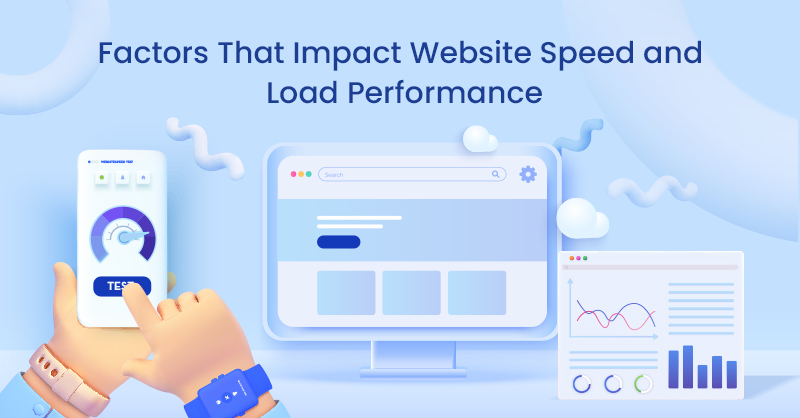1. Why Speed & Performance Matter in Web Hosting
Website speed and performance play a crucial role in determining the success of any online presence. Studies show that 53% of users abandon a website if it takes more than three seconds to load. Additionally, search engines like Google prioritize fast-loading websites in their rankings, making speed a critical factor for SEO.
A fast website enhances:
- User Experience: Visitors expect instant access to content, and slow sites lead to frustration.
- SEO Rankings: Google considers page speed a ranking factor, meaning faster sites gain better visibility.
- Conversion Rates: Studies indicate that a 1-second delay in page load time can reduce conversions by 7%.
- Bounce Rate Reduction: Slow websites often experience higher bounce rates, meaning users leave before interacting with the content.
Optimizing speed isn’t just about keeping visitors happy—it’s a direct factor in revenue, brand reputation, and digital success.

2. Key Factors Affecting Website Speed
Several elements contribute to a website’s speed and overall performance. The following factors must be considered:
1. Server Response Time (TTFB - Time to First Byte)
TTFB measures how quickly a server responds to a request. A slow server leads to delayed website loading, negatively impacting performance.
2. Hosting Type and Resources
Shared hosting tends to be slower due to resource limitations, whereas VPS and dedicated hosting offer better speed and control over server resources.
3. Image & Media Optimization
Large, uncompressed images can significantly slow down a website. Using modern formats like WebP and implementing lazy loading helps improve speed.
4. Code Optimization
Minimizing CSS, JavaScript, and HTML reduces unnecessary code execution, leading to faster rendering times.
5. Content Delivery Network (CDN) Usage
A CDN distributes website content across multiple servers globally, reducing latency and ensuring fast load times regardless of user location.

3. How Web Hosting Influences Performance
The choice of web hosting provider and plan has a direct impact on a website’s speed. Below is a comparison of different hosting types and their performance capabilities:
| Hosting Type | Performance Level | Best For |
|---|---|---|
| Shared Hosting | Low | Small websites, blogs |
| VPS Hosting | Medium-High | Growing businesses, developers |
| Dedicated Hosting | Very High | Large enterprises, resource-heavy applications |
| Cloud Hosting | High | Scalable applications, global traffic |
Key hosting-related factors affecting performance:
- Server Location: Choosing a hosting provider with data centers close to your audience reduces latency.
- SSD Storage: Solid-state drives (SSD) are much faster than traditional HDDs, improving load times.
- Server Caching: Technologies like LiteSpeed, NGINX, and Varnish Cache enhance website speed.

4. Best Practices to Improve Website Speed
To maximize website performance, implement the following optimization techniques:
1. Enable Gzip Compression
Gzip reduces the size of HTML, CSS, and JavaScript files by up to 70%, leading to faster page loads.
2. Optimize Website Images
Use tools like TinyPNG or ImageOptim to compress images without losing quality. Implementing lazy loading also helps reduce initial load time.
3. Use a Content Delivery Network (CDN)
A CDN caches website files across multiple geographic locations, reducing the time needed to load pages for users worldwide.
4. Minimize HTTP Requests
Every element on a webpage (images, scripts, stylesheets) generates an HTTP request. Reducing these requests speeds up page load time.
5. Implement Browser Caching
Caching stores static files locally on a user’s device, reducing server load and improving repeat visit speeds.

5. Choosing a High-Performance Web Hosting Provider
Selecting a reliable hosting provider is one of the most critical steps in ensuring fast website performance. Here’s what to look for:
1. Server Uptime & Reliability
Choose a provider offering 99.9% uptime or higher to ensure consistent performance.
2. Server Speed & Data Centers
Opt for a host with SSD storage, LiteSpeed technology, and global data centers for faster load times.
3. Built-in Performance Features
Look for features like automatic caching, CDN integration, and optimized server configurations.
4. Customer Support & Scalability
24/7 support ensures technical issues are resolved quickly, while scalable hosting plans allow seamless upgrades as traffic grows.
5. Popular High-Performance Hosting Providers
Some of the best hosting providers for speed include:
- SiteGround (Known for its optimized servers and caching solutions)
- A2 Hosting (Offers Turbo Servers for faster page loads)
- Cloudways (Managed cloud hosting with performance-focused infrastructure)
- Kinsta (Premium WordPress hosting with Google Cloud integration)
![How To Choose a Hosting Provider? [17 Practical Tips] - N6cloud](https://n6cloud.com/blog/wp-content/uploads/2020/06/how-to-choose-a-web-hosting.jpg)


You must be logged in to post a comment.